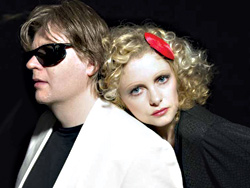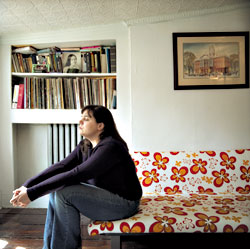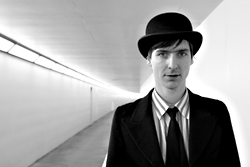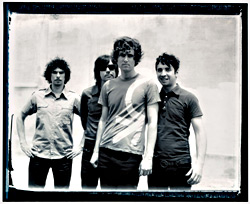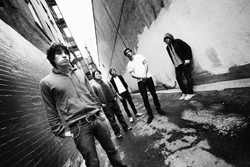The first album singer Alison Goldfrapp and programming whiz Will Gregory made as Goldfrapp, 2000’s Felt Mountain, seduced listeners with its gorgeous trip-hop atmospherics and spooky Weimar Republic overtones. Nominated for England’s Mercury Music Prize (the U.K.’s equivalent of the Grammy for Album of the Year), the disc made electronic music stars out of the pair—especially the iconic fashion plate Goldfrapp, who first flexed her vocal chops on tracks by Tricky and Orbital. What it didn’t do was make Goldfrapp the band a favorite of rowdy, attention-starved concertgoers.
“After going onstage at festivals after bands like Queens of the Stone Age,” Gregory chuckles, on the phone from England, “we just thought, well, if someone had said to us that we were gonna be playing after this band on this stage, maybe we wouldn’t have written the material that we’ve come up with.”
Properly humbled, when the duo set about making Felt Mountain‘s follow-up, they kept in mind their underwhelming live show, consciously avoiding making what Gregory calls another “glacial studio record.” “We felt like we wanted to do some up-tempo things. We wanted to bring the drums to the front and just have a bit more of that kind of action.”
The result of their experiment, 2003’s pumping Black Cherry, is all about action. A self-consciously sleazy electro-glam romp, the album redefined Goldfrapp as purveyors of sex-drenched post-electroclash pop. They continue in that direction on Supernature, which came out in England last summer but didn’t hit American stores until March of this year. Like an alternate-dimension Kylie Minogue record, Supernature is full of chewy electronic textures studded with catchy hooks and propulsive beats. In opener “Ooh La La,” Goldfrapp commands some lucky chump to “switch me on” over a futuristic refraction of the deathless shuffle-stomp groove from Gary Glitter’s arena anthem “Rock and Roll Part 2”; in “Lovely 2 C U” Gregory threatens to drown out Goldfrapp’s vocal with grinding synthesizer fuzz. Anchored by a bleacher-stomping beat and a handful of fat keyboard riffs, “Slide In” could be an English “Hollaback Girl,” while “Ride a White Horse” throbs like space-age Blondie.
Indeed, the album has brought Goldfrapp as close as they’ve ever gotten to the pop mainstream (which still isn’t terribly close). To American ears, there’s not an enormous amount of difference between the sounds on Supernature and what you might hear on records by U.K. pop stars like Rachel Stevens, a former member of the squeaky-clean teen act S Club 7, and Girls Aloud (give or take the occasional Goldfrapp reference to bestiality). And there’s much to the new album that fits into the current vogue for all things 1980s. Gregory, who suspects that the Madonna comparisons his bandmate regularly receives are primarily due to the fact that “Alison has got blond hair,” accepts such praise with caution.
“I think we’re a bit scared of being too engaged with the mainstream,” he says carefully. “When you travel in a car here, you can stop at these service stations that are a bit like Wal-Mart, and very often they have bins full of very cheap CDs. I think we’re scared of that—of landing in the dustbin of yesterday’s pop sensations.” He laughs a little laugh in his polite English fashion. “I just think we don’t wanna be making disposable music. We care quite a lot about our music, and you wanna be able to listen to it more than once. But, God, you know—we’ve never been mainstream, so I shouldn’t knock it. I don’t know what it’s like. It could be great!”
